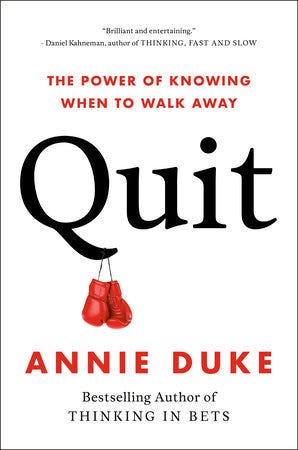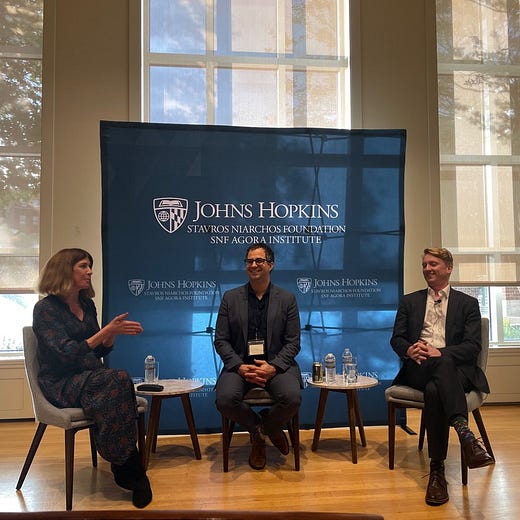INTERVIEW with Annie Duke on "QUIT: The Power of Knowing When to Walk Away"
Issue 55: Interviewing Annie Duke about her newly released book!
This week, we are featuring an interview with Annie Duke, who released her fabulous new book, QUIT: The Power of Knowing When to Walk Away a few weeks ago. We already had a chance to read the book and it is loaded with fascinating stories and useful insights. Annie makes the important point that we underestimate the value of quitting and this can have some catastrophic consequences. She also points out that quitting something connected to our core identity is especially challenging and can leave people clinging to everything from a failing business to a debunked conspiracy theory.
Annie Duke is an author, professional poker player, and Psychology PhD student. Most people know her as the only woman to have won the World Series of Poker Tournament of Champions (at one point she had won more money in poker than any woman in history). But we like to think she got her decision-making chips from her training in Cognitive Psychology at the University of Pennsylvania (where she recently returned to finish her PhD). Her previous book, Thinking in Bets, which bridged her life in poker with her expertise in the psychology of decision-making, is a national bestseller. She is also part of the Renew Democracy Initiative and the co-founder of The Alliance for Decision Education, a non-profit whose mission is to improve lives by empowering students through decision skills education.
In this interview, Annie dissects the bias against quitting and points to how ideas about identity and group dynamics can explain why it’s so hard to quit. Annie was one of the very first people to read a draft of “The Power of Us” so it is a pleasure to have her join us to discuss her latest book.
What does your book teach us about group dynamics?
Group dynamics play a big role in our bias against quitting because the hardest thing to quit is who you are. Being part of a group contributes to our failure to quit in two main ways:
1) It is hard for us to quit the tribes we belong to, even when there is clear evidence that we ought to walk away. We can see this clearly with doomsday cults like the one documented in When Prophecy Fails. Even when the prophesied end of the world came and went, the majority of the cult members stayed. More than that, they escalated their commitment to the cause.
This bias against quitting group membership is not just a problem with cults. It is a problem with any tribe that defines you, including your political tribe. When you are a member of a group, your identity becomes wrapped up with that sense of belongingness. When the facts conflict with the beliefs that are part of your identity, you will tend to reject the facts in order to maintain the belief system associated with your group.
2) In addition to belongingness acting as a force that biases us against quitting, so does our sense of distinctiveness. Our sense of identity doesn't just come from the groups we belong to but also from the way we see ourselves as distinct from other groups. When we hold beliefs that makes us stand out from the crowd, these become part of our identity. When the facts conflict with these beliefs, the facts will lose out.
This is particularly true for extreme beliefs because these beliefs more strongly define you as different from other people or groups. If you used to believe that Pluto was a planet and then scientists tell you that is incorrect, you will easily quit that belief because everyone believed that along with you. Believing Pluto was a planet was not part of your identity.
But if you believe the earth is flat, that is a different story because that believe is extreme, making you stand out from the crowd. Flat-earthers are biased to reject the facts in order to maintain their belief because their beliefs more strongly define them.
Obviously, in this day and age of belief systems like Q Anon, this tendency to escalate commitment to extreme beliefs in the face of disconfirming evidence is very concerning. The beliefs that makes us feel a sense of belongingness and distinctiveness make up our identities. The hardest thing to quit is who you are, facts be damned.
What was the most surprising thing you learned as you were writing the book?
What surprised me the most is the intuition I think we all share when there are clear signals that what we are doing isn't working, we will walk away. Take Siobhan O'Keefe who was running the 2019 London marathon when she started feeling pain in her leg on Mile 4. On Mile 8, her fibula bone snapped. And yet she kept running, finishing the 26.2 miles on a broken leg. Amazingly, three other runners in the same marathon broke bones in the race and still finished. This is a common story.
We think that if we were to break a bone in the middle of a marathon, we would stop running. We think that if we start a project where the budget triples and the timeline is completely blown, we will quit and turn our attention to something else. We think that when we take a job and it turns out our boss is toxic we will quit.
But we don't. Our intuition is just wrong. We continue on, well past the point of rationality, plugging away at something that from the outside looking in we should obviously be quitting.
One of the most heartbreaking stories that acts as a cautionary tale come from Jeffrey Rubin, a well know psychologist who was one of the first to document our tendency to get stuck in things once we have started them, even when it is obvious we should walk away. Rubin was an avid mountain climber. One day he was climbing a peak in New England when a heavy fog rolled in. Rather than turn around, he continued climbing only to perish that day on the mountain.
If an expert like Rubin fell prey to our bias against quitting, we all need to par attention to that cautionary tale.
What is the biggest unanswered question on this topic going forward?
Why are those who persevere the heroes of our stories?
We care little about how the opportunities we are neglecting would turn out. Work on biases like the sunk cost fallacy give us a clue into how the fear of waste drives us to stick to things too long. But the admiration we have for the ones who stick to it is a puzzle to me that remains unanswered.
Do you have any practical advice for people who want to apply these ideas?
When it comes to quitting, the most effective strategies don't leave it to you, in the moment, to make a rational decision about when to walk away. The two most practical things you can do to become better at quitting when the time is right is to think ahead and to get outside help.
We know that we will be bad at paying attention to the signals that we ought to walk away when we encounter them. But if we think in advance about what those signals might be and make a commitment to walk away when we seems them, the research shows that we will be better at cutting our losses. I call these signals kill criteria.
A simple example of a kill criterion is a turn around time in mountain climbing. When climbing a mountain, like Everest, expedition leaders set turn around times for each day's climb. For example, on summit day, the turn around time is 1pm. That means that no matter where you are on the mountain, whether you have reached the summit or not, if it is 1 pm you must turn around and head back to Camp 4. The turn around time is meant to mitigate the dangers of summit fever, stop you from making bad decisions about persevering when you are so close to your goal. This ultimately saves lives as climbers who follow the turn around times avoid the dangers of descending the mountain in the darkness.
Another strategy to get better at quitting is to enlist a quitting coach, simply an outside observer to help us with the decisions. We have all had the experience of knowing someone in a dead end job or a bad relationship where we can see so clearly that they should walk away, but they can't see it for themselves.
It stands to reason that what is true for what we might see in others is true for what they might see in us. So we ought to enlist other people who can help us to see what we can't see when we are in it. This person could be a mentor, peer or a therapist or anyone you trust to have your long-term best interest at heart. As long as you have given them permission to tell you the truth, even if the truth is hard and might hurt your feelings in the moment, a quitting coach can be very effective for helping you to get out of bad situations more quickly.
News and Updates
We hosted their first ever in-person book event at the SNF Agora Institute at Johns Hopkins University last week. It was great seeing everyone come out and we plan to host more public events in the future!
Catch up on the last one…
In our last newsletter, we reviewed the leadership episode of our four-part video series. Drawing on examples from exemplary leaders like Nelson Mandela, we debriefed research on how leaders can communicate more effectively and bring people together using the power of identity.








Hello, Do you happen to have the video of the JH event from last week?